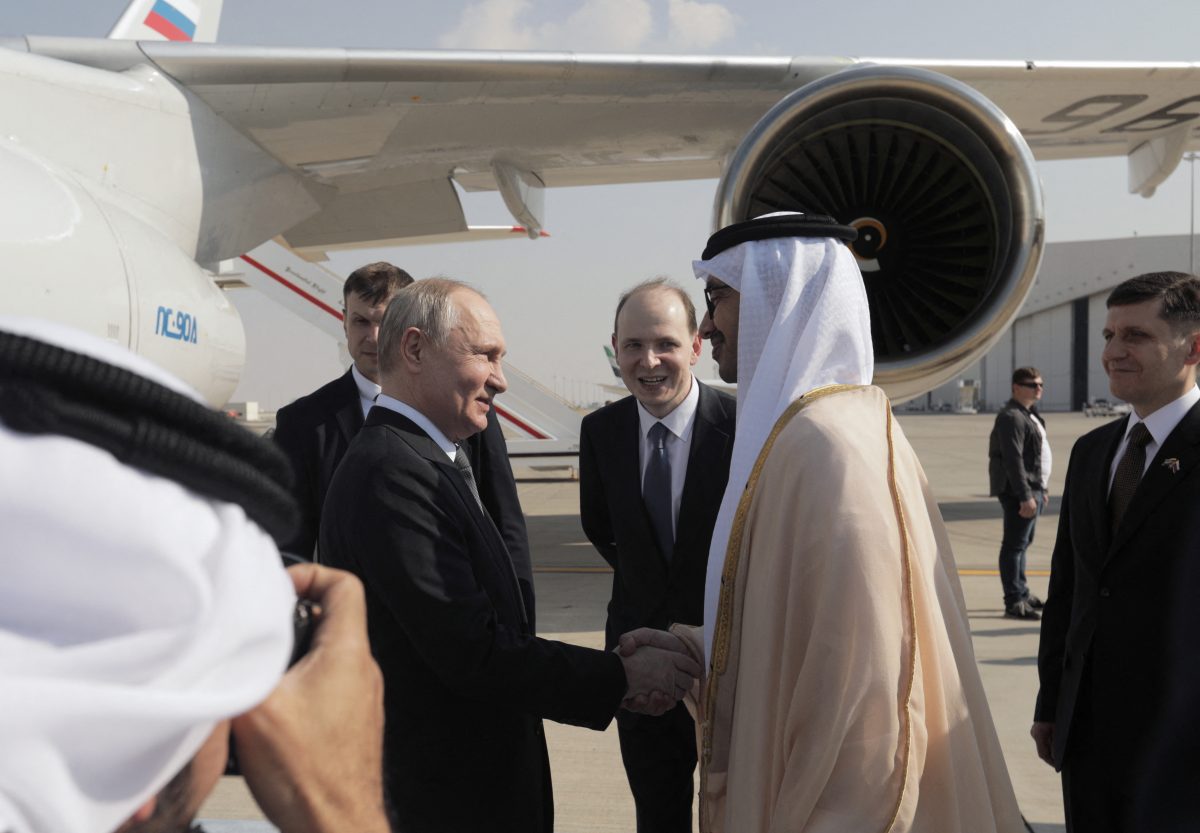MOSCOW, (Reuters) – President Vladimir Putin was escorted to the Middle East by four Russian fighter jets on Wednesday for a rare trip abroad, during which he will discuss oil production and OPEC+ with Saudi Arabia’s Crown Prince Mohammed bin Salman.
Putin’s meeting with the prince known as MbS comes after oil prices fell despite a pledge by OPEC+, which groups the Organization of the Petroleum Exporting Countries (OPEC) and allies led by Russia, to further cut output.
The President’s plane was flanked by Sukhoi-35S fighter jets, which the defence ministry showed flying beside his Ilyushin-96 aircraft from Russia to the United Arab Emirates.
In Abu Dhabi, President Sheikh Mohammed Bin Zayed Al Nahyan called Putin his “dear friend” and UAE jets greeted the Kremlin chief with a fly-past trailing the colours of the Russian flag.
“Our relations, largely due to your position, have reached an unprecedentedly high level,” Putin told Sheikh Mohammed. “The UAE is Russia’s main trading partner in the Arab world.”
Putin said Russia and the UAE cooperated as part of OPEC+, whose members pump more than 40% of the world’s oil, adding that they would discuss the Israeli-Hamas conflict and Ukraine.
After the UAE, Putin is due to travel to Saudi Arabia for his first face-to-face meeting with MbS since October 2019. His last visit to the region was in July 2022, when he met Supreme Leader Ayatollah Ali Khamenei in Iran.
It was not immediately clear what Putin, who has rarely left Russia since the start of the Ukraine war, specifically intends to raise about oil markets with the crown prince of the world’s largest crude exporter, just days after disagreements delayed a key OPEC+ meeting.
The Kremlin said that as well as oil, they will talk about the war between Israel and Hamas militants, the situation in Syria and Yemen, and issues such as ensuring stability in the Gulf, while an aide said Ukraine would also be discussed.
Putin will host Iranian President Ebrahim Raisi in Moscow on Thursday, Kremlin spokesman Dmitry Peskov said.
Putin and MbS, who together control one-fifth of the oil pumped each day, have long enjoyed close relations, though both have at times been ostracised by the West.
At a G20 summit in 2018, just two month after the murder of journalist Jamal Khashoggi in a Saudi consulate, Putin and MbS high-fived and shook hands with smiles.
MbS, 38, has sought to reassert Saudi Arabia as a regional power with less deference to the United States, which supplies Riyadh with most of its weapons and which is the world’s top producer of oil.
Putin, who sent troops into Ukraine in February 2022, says Russia is engaged in an existential battle with the West – and has courted allies across the Middle East, Africa, Latin America and Asia amid Western attempts to isolate Moscow.
Both MbS and Putin, 71, want – and need – high prices for oil – the lifeblood of their economies. The question for both, is how much of the burden each should take on to keep prices aloft – and how to verify the burden.
OPEC+ last month delayed its meeting by several days due to disagreements over production levels. Saudi’s energy minister said OPEC+ also wanted more assurances from Moscow it would make good on its pledge to reduce fuel exports.
Relations between Saudi and Russia in OPEC+ have at times been uneasy and a deal on cuts almost broke down in March 2020, with markets already shaken by the onset of the COVID pandemic.
But the two managed to patch up their relations within weeks and OPEC+ agreed to record cuts of almost 10% of global demand.
Since war broke out between Israel and Hamas in October, Putin has cast the conflict as a failure of U.S. policy in the Middle East and has fostered ties with Arab allies and Iran, as well as with the militant Palestinian group.
When Russia intervened in Syria in 2015, it helped tip the balance in Bashar Al-Assad’s favour, ensuring the president’s survival in the face of Western calls for his ouster.









